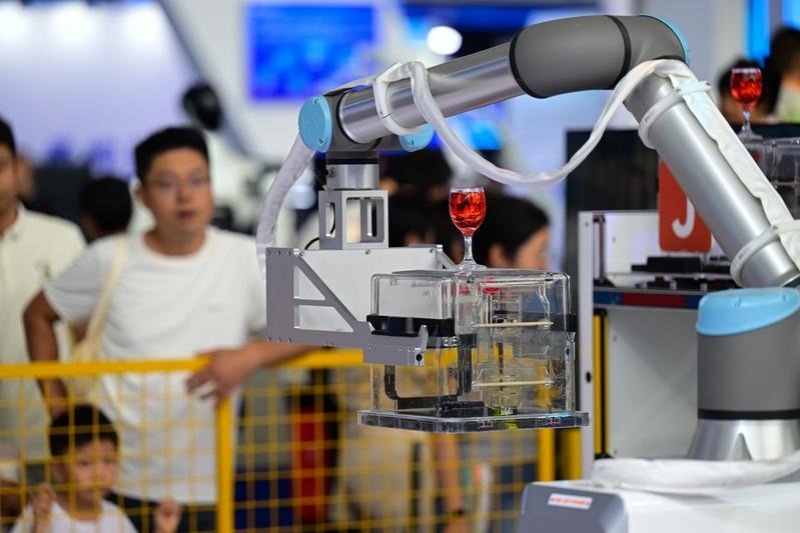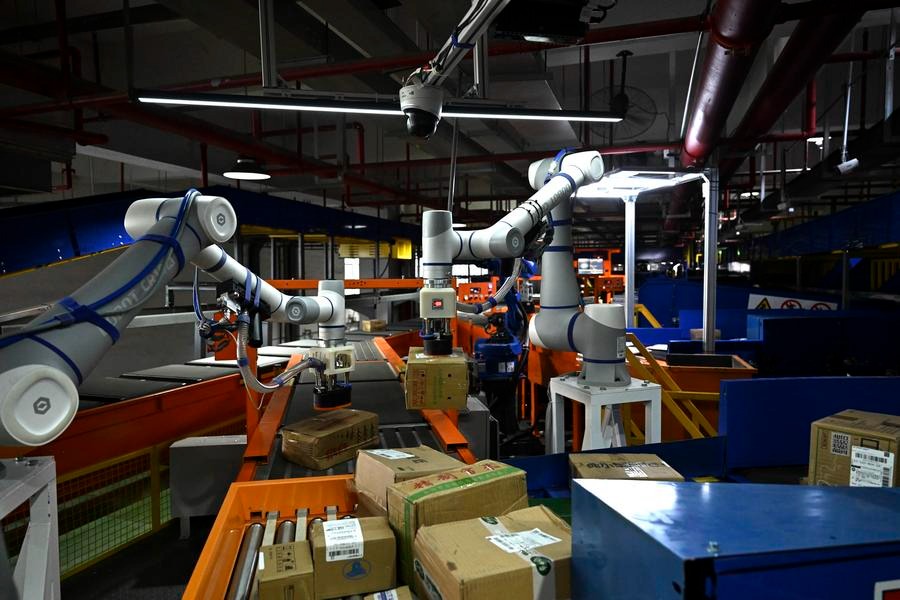Worked To The Bone

Chinese employees are used to doing overtime - they see it as a necessary means of securing career progression - but experts say such habits can prove to be fatal
Deng Lejun is scheduled to become a father for the second time in about two months, but he isn't quite sure if he would even get to witness the momentous occasion.
As the fund investment director at a privately-owned investment company, Deng works on average 24 extra hours per week.
"The nature of my work means there are many impromptu tasks,so getting assigned extra work is very common. I occasionally have to leave the table when having dinner with my family and relatives to have a telephone conference about urgent projects," said the 35-year-old Hunan native.
Deng added that one of his toughest assignments involved having to complete a huge project within just two weeks. He and his team ended up spending most of their time at the project site,working till as late as 3 am every day and having to wake up by 6 or 7 am.
This issue on overtime cultur has inherently sparked discussions about the need to maintain work-life balance and the types of problems frequent overtime work can cause to not just individuals,but their families as well.
In late August, 40 women brandished placards in a downtown shopping mall as part of a performance art event that sought to raise awareness about the family problems that overtime work have triggered.
Written on the placards were quotes such as: It's such a luxury for me to lie on the sofa and watch TV with you; Do you know that I'm four weeks pregnant; Do you remember the last time that you kissed me; I do not want a designer handbag, I just want you to hug me.
Xie Nana started work in a public relations agency in Shanghai two years ago and she said she once had to work overtime for anentire month.
"On average, I work fi ve weeks a month, which means I work an extra four to fi ve hours every day in a month," said Xie.
"One of the craziest overtime working experiences happened in a weekend in late August when I got a call from a client asking me to complete an urgent task in a day. I worked on the project from four in the morning until 7 pm the next day."
However, the 24-year-old said that she does not mind working overtime as she is paid extra for her efforts. Xie, who dreams of working for a Fortune 500 company one day, also believes that she is honing her abilities and tolerance for stress with all the extra work.
A widespread phenomenon Research has shown that many other people in the same shoes as Deng regard overtime work as an obligation they have to fulfi ll else they risk losing their competitiveness in the workplace.
"Chinese believe that working overtime helps them to stay competitive. Working overtime is also a unique phenomenon in developing countries like India or Bangladesh," said Yu Hai, a Fudan University sociology professor.
"I have lived in Canada for a year and I realized that few people there work overtime. This may have a lot to do with their strict labor laws, strong labor unions and the attitude towards work and life."
According to Yu, working overtime has today become part an intrinsic part of company culture across China, regardless of whether it is a domestic enterprise or foreign corporation, and no matter the type of profession.
"Take a taxi driver in the city for example - he or she has to work for at least eight hours to pay for the car rental and fuel. This means that they have to work even longer to make a profi t," Yu said.
He also noted that a Chinese university professor often has to do twice or even triple the amount of work a European professor does in order to earn the same amount of money.
Gu Xiaoming, a sociology professor from Fudan University,cited the nature of today's society as part of the reason for overtime work.
"We have arrived at a new age where the defi nition of working overtime has become deeply rooted in the workplace, especially for people who work in the creative and software industries," said Gu.
"Also, the development of Chinese enterprises require employees to work harder so that their companies have an edge in the highly competitive industry."
A worthwhile sacrifi ce for a better future
To others, however, working overtime doesn't actually result in direct financial gain. Zhou Yu, a Shanghainese who works as an analyst at a telecommunications enterprise, agrees that doing overtime is the only way to maintain a competitive edge in the cosmopolitan city. He does not get overtime pay.
"We have to take care of both our parents and our kids. In order to have better career progress and prospects, we have to put in extra eff ort in work to make ourselves look outstanding," said Zhou,who has at least one extremely busy week per month when work starts at 8:30 am and ends around midnight every day.
"However, that was nothing compared to my crazy experience of having just 10 hours of rest in three days," recalled the 32-year-old who added that he has found his body takes a longer time to recover after working overnight.
Yan Yuejin, a research director at a real estate research institution,does overtime every day due to the nature of his job. He often has to consult government officials and deal with numerous queries from enterprises and individuals.
He recalled having to rush to complete an analysis about a new property policy in Nanning,Guangxi Zhuang autonomous region, after a state media reporter had requested that he provide one before 3 am.
However, Yan does not lament having to do extra work. In fact,he does so willingly.
"I often volunteer to work overtime because it boosts my career prospects. The skyrocketing home prices and the pressure of having to pay for a mortgage have also pushed me to work harder so that I can make more money," said Yan.
While Yan has already gotten used to the large workload, the irregular meal times and lack of sleep have had an adverse impact on his health. Yan is determined to rectify this situation once he gets married. But the problem now, he says, is that he doesn't even have the time to fi nd a girlfriend.
Learning how to deal with overtime work
Chen Haidong, a father of a three-year-old son, said that he only has half an hour during breakfast on weekdays to play with his toddler.
An employee at a foreign company,Chen usually works till 9pm every day and he considers himself very lucky if he actually gets to spend a complete weekend with his family.
Having been in the workforce for eight years, he added that he has learned how to induce some fun into overtime work.
"When I fi rst started work at a local company, I had a really tough time. I had no social life. I was just working day and night,"said the 33-year-old.
"Now, when overtime work cannot be avoided, I would share cigarettes with my colleagues and we would order barbecue at midnight to add some joy to our exhausting jobs," he said.
Another way of dealing with the stress, said Chen, is convincing himself that his current woes are akin to an investment, that"working overtime today means not having to work overtime in the future".
However, he does concede that it is impossible to escape having to do overtime work as getting promoted equates to having even more responsibilities.
Regardless, he still tries his bestto strike a balance between work and life.
"It is very diffi cult, but I've tried to make the best of it. And for me,taking my boy out and being withhim is the best way for decompression.It makes me forget my work"
A future of no overwork?
China has a slew of labor laws and regulations that aim to tackle the problem of companies overworking their staff .
The latest 2015 edition of China'slabor law states that employees'health must be taken seriously and that they should not work more than eight hours a day. The total working time should also be within 40 hours per week. It also stipulates that on occasions when employees have to work overtime,they should not be working for more than three extra hours perday, or more than 36 hours per month.
In addition, employees working overtime should be paid between 150 and 300 percent extra of their original daily salaries.
Unfortunately, experts said that many companies ignore the regulations regarding maximum work hours and extra pay. Some even resort to sacking their employees who are resistant to the overtime work culture.

After several months of having to work from 8 am to midnight as well as having to drink three cups of coff ee every day, Louisa Luo said that her health has taken a serious beating.
"I have asthma and there's a time of the month when I'mconstantly coughing due to allergies.But everybody around me is working so hard, as if there is no tomorrow, so I just have to follow.I don't really see a future here for me but I don't have a choice,"said the 36-year-old mother of a kindergarten boy.
Deng is no diff erent. He said that his health has worsened and that almost all his colleagues are suff ering from cervical problems as a result of their sedentary lifestyle where they are constantly seated at their desks.
According to the 2015/2016 Staying@Work Survey by global risk management and advisory firm Willis Towers Watson, stress is the leading workforce risk in the world.
In the Asia Pacific, however,the biggest employee health risk was cited as the lack of physical activity.
Researchers have also found that problems arising from work-related health problems or depression result in massive losses for companies. For example,the European Risk Observatory has estimated that work-related depression and absenteeism cost companies in Europe e617 billion ($693 billion) and e272 billion respectively every year.
"The rising labor costs in China and people's growing awareness of their rights will eventually make the cost of working overtime too large to afford. This could probably signal the start of the end of such overtime practices,"said Yu.
Gu also urged domestic companies to be more ethical in their treatment of their employees, saying that an overworked employee who ends up sick or depressed would very likely cause more problems than solve them.
In 2014, a Tokyo court ordered a restaurant to pay 58 million yen ($568,797) in compensation to the family of an employee who was found to have committed suicide after working nearly 200 extra hours a month for seven months.
wang_ying@chinadaily.com.cn


(China Daily USA 09/16/2016 page8)
Today's Top News
- Japan unqualified for UN Security Council: Chinese envoy
- Deforestation is climate action's blind spot
- Japan unqualified for UN Security Council: Chinese envoy
- China, Germany reach outcomes after discussions
- Chinese cities dominate global science hub rankings
- Japan's tourism battered as Chinese travelers cancel trips






























